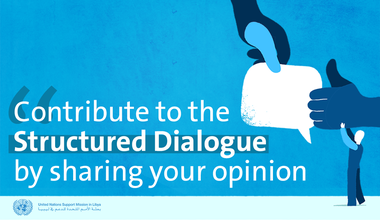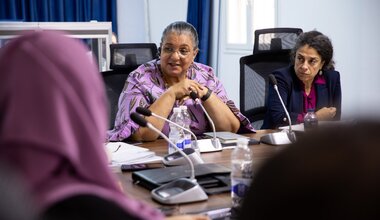Libyan journalists, activists and social media influencers meet in Cairo and agree to combat hate speech
CAIRO/TRIPOLI, 13 November 2019 - A group of leading Libyan journalists, bloggers and social media influencers attended a workshop on “Combating Hate Speech and Ethics of Journalism”, held in Cairo last week.
Participants, including eight women, who represent various Libyan media outlets that broadcast/publish from both inside and outside Libya reached a set of recommendations related to the need for defining “hate speech” and ways to address it by adhering to the ethical principles of journalism. The 17 participants stressed the importance of raising awareness of the risks and consequences of hate speech, disinformation, fake news and incitement. They recommended to have appropriate legislation and mechanisms in place for monitoring online and offline inappropriate content, pertaining to hate speech and incitements.
At the closing session, Special Representative of the Secretary-General (SRSG) in Libya and Head of UNSMIL Ghassan Salame stressed the importance of joining hands to fight hate speech due to the devastating danger it poses to Libya's social peace and social fabric. "Hate speech and fake news are very widespread representing a very serious problem,” according to SRSG Salame. “Hate speech is a result of the accumulation of negative emotions, which require serious efforts to be treated. It is extremely important to maintain constructive dialogue.”
“Dialogue is also a struggle, not with the other but with oneself,” added SRSG Salame, “Because a genuine dialogue commits you to accept the other’s otherness, to accept that his otherness is legitimate and, more importantly, to accept to be impacted by the other’s views during your dialogue with him or her.”
The two-day workshop, funded by UNDP and facilitated by UNSMIL on 3-4 November, highlighted the disturbing spread of hate speech in Libyan media and social media platforms with a focus on a Human Rights perspective on the Rabat Declaration, particularly on how to address this matter without compromising freedom of expression and human rights principles. Examples of hate speech, incitement, disinformation and fake news flooding the Libyan media space were presented and discussed by the participants. In addition, Facebook's Policy Team in North Africa presented the latest trends in Facebook, Facebook community standards, and the Artificial Intelligence being deployed to combat fake accounts, hate speech, and inappropriate content.
“We as female journalists face unlimited challenges including incitement and threats on social media. We have to work together- men and women- to address this wave of incitement, hate speech, libel and distortion,” said Maye Keilani, a TV host in Benghazi. In addition, Essa Rashwan, a social media influencer and activist, said “We are grateful for the opportunity to discuss how to combat hate speech in Libyan media, and for engaging Facebook in the discussion. Spread of hate speech and disinformation on Facebook is a very serious concern. It seems to be an organized work contributing to creating further divisions in Libyan society.”
The Cairo workshop is the second in a series of events initiated by UNSMIL's Public Information and Communications Unit as part of an effort to counter hate speech and disinformation in conjunction with ongoing efforts to revive the political process. The first workshop was organized in Tripoli in September and was attended by 30 participants, nearly half of whom were women.
Below is the list of recommendations for social media users, activists and media outlets in Libya:
- Refrain from posting or promoting disinformation or fake news that fuel hate speech on social media.
- Respect intellectual property rights.
- Respect privacy of others.
- Accept differences, respect diversity and others’ points of view
- Raise awareness on the importance of enacting legislation on negative consequences of hate speech in traditional and social media platforms
- Respect human values and principles in all social media content.
- Urge Libyan media to promote an inclusive national narrative
- Join hands and network with UNSMIL, local and international organizations licensed by the State of Libya to counter hate speech.
- Uphold professional standards, especially objectivity, accuracy, credibility and impartiality
- Protect sources [of information].
- Establish and empower press trade unions
- Establish a mechanism to monitor and track hate speech in traditional media and media
- Urge civil society organizations and social figures/influencers to address hate speech
- Urge the competent local and international organizations to provide psychosocial support to victims of hate speech
- Provision of support to media personnel by the State of Libya
 United Nations Peacekeeping
United Nations Peacekeeping UN
UN









